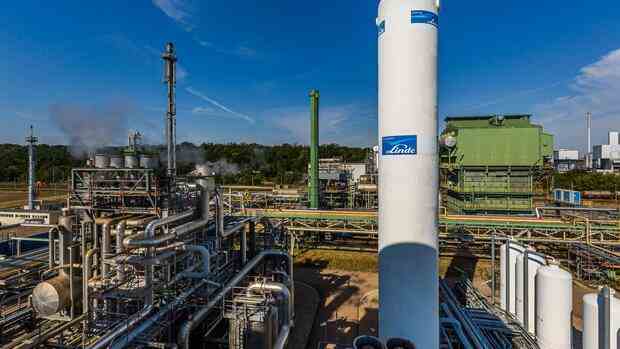Linde is one of the most keen patent applicants in the hydrogen sector.
(Photo: IMAGO/imagebroker)
Munich, Stuttgart According to a patent study, German companies are technological leaders in Europe when it comes to the future topic of hydrogen. “Harnessing the potential of hydrogen is an essential part of Europe’s strategy to achieve climate neutrality by 2050,” said António Campinos, President of the European Patent Office (EPO). However, further innovations are urgently needed for this.
In a long-term study, the EPA, together with the International Energy Agency (IEA), examined the registrations of inventions in the field of hydrogen technologies worldwide in the years 2011 to 2020. This is a good early indicator for current and future developments, because patents are often filed years before products appear.
Hydrogen as storage for renewable energies
Globally, Japan leads with a 24 percent share of patent applications ahead of the USA with 20 percent, which has lost some ground in recent years. The EU member states come together to 28 percent, Germany as the leading applicant here eleven percent. More than every tenth hydrogen patent worldwide was submitted by German companies. France submitted six percent of the patents, the Netherlands three percent.
According to the EPA, many innovations from Europe are focused on the automotive industry when it comes to end applications. Other sectors such as long-distance transport, power generation and heavy industry still require “specific further development”.
Top jobs of the day
Find the best jobs now and
be notified by email.
>> Also read: Climate killer hydrogen? The supposed beacon of hope has a problem
Hydrogen is considered a crucial element of the energy transition. Because electricity from renewable energies is stagnating: when the wind is blowing or the sun is shining, there is often an abundance of it – but often it cannot be stored. This excess electricity is to be converted into hydrogen in the future.
This green hydrogen can then help energy-intensive companies – for example the steel industry – to reduce CO2 emissions. Hydrogen is also considered a possible alternative to fossil fuels in the transport sector, for example in cars with fuel cell drives or in hydrogen trains.
By 2050, more than 5.4 million jobs are to be created in the European hydrogen industry alone, with sales of more than 800 billion euros a year. This is what the “Hydrogen Roadmap Europe” predicts, a study by the “Fuel Cells and Hydrogen Joint Undertaking”, to which the EU Commission also belongs.
However, other regions of the world also want to occupy the growth market. The USA recently attracted innovative companies with the Inflation Reduction Act.
German companies are world leaders in hydrogen
The industry is also hoping for greater support from politicians in this country. “Germany has so far had a good position in the hydrogen market,” said a spokesman for Siemens Energy. “We have plant expertise, a good electrochemical industry and materials expertise.” In order to stand up to other regions of the world, there needs to be less discussion and more action. Among other things, Siemens Energy is developing electrolysers that use electricity to break down water into hydrogen and oxygen.
German companies want to continue to secure a large share of the hydrogen business. Linde, which merged with US competitor Praxair in 2018, has ranked second worldwide in patent applications in the established hydrogen technology segment over the past decade, according to the EPA. BASF in fifth.
In addition to Siemens, Bosch was also able to place itself well at the top. “As a pioneer in the field of hydrogen innovation, Bosch will continue to push ahead with its development and research work in the fields of electrolysis and mobile and stationary fuel cells at a high level,” announced CEO Stefan Hartung.
For him, the focus on the topic of the future has two advantages. Bosch can shape the future of the company – but also make a “significant contribution” to climate protection and to strengthening the competitiveness of the European hydrogen economy. For example, the automotive supplier equips vans with fuel cells.
More: This is how the USA wants to conquer the hydrogen market

